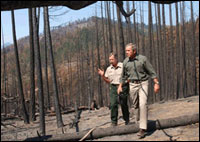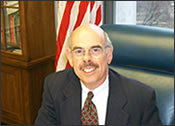On Tuesday, the Los Angeles Times published an editorial by the widely known environmental gadfly Gregg Easterbrook — a senior editor at the New Republic and a fellow at the Brookings Institution — who set out to roast (or rather deep-fry) critics of the Bush administration’s environmental record. He dismissed charges made by everyone from the Natural Resources Defense Council to Sen. James Jeffords (I-Vt.) as “baloney — baloney being rolled and deep-fried with cheese for purposes of partisan political bashing and fund-raising.”

Bush communing with nature.
Photo: White House.
While Easterbrook scores a few points for entertaining analogies, he loses many more for a polemic “so preposterously distorted, so replete with factual errors, that it’s appalling to me that it was published anywhere, much less someplace like the L.A. Times, which tends to be strong on these issues,” said Frank O’Donnell, executive director of the Clean Air Trust. Easterbrook’s argument comes from “Everything You Know About the Bush Environmental Record Is Wrong,” a report he wrote for the Brookings Institution and the right-wing American Enterprise Institute’s Joint Center for Regulatory Studies. [Click here to download a copy of the report.] The crux of both the op-ed and the report is that the environment, and in particular air quality, has been getting dramatically better over the years — so what’s the harm in weakening a few regulations?
The numbers Easterbrook cites about air-quality improvement are exaggerated, according to O’Donnell; Easterbrook notes, for instance, a 33 percent reduction overall in nitrogen oxide emissions since 1990 when the number more widely accepted by experts is 12 percent. More intolerable, however, is the way he ignores the primary reason these improvements came about in the first place: the very “command and control” regulations that President Bush is trying to eliminate, and that Easterbrook claims are unnecessary.
The op-ed has too many transparently preposterous statements to eviscerate them all here (take “logging is one of the few endlessly sustainable industries,” for example). But the ones that deserve perhaps the most scrutiny are those that applaud Bush for his supposed environmental accomplishments: “Bush has implemented three major new environmental reforms for which he has received zero credit,” writes Easterbrook. “He ordered that diesel fuel be reformulated to reduce its inherent pollution content … He ordered that new diesel trucks and buses meet significantly stricter emissions standards … he imposed new emissions standards on a range of previously unregulated [construction and off-road] machines.”
Problem is, Bush had nothing to do with the first two of these three “major new” reforms. “I spent five years working on those diesel rules, negotiating with industry and the president [Clinton] to push them through,” Carol Browner, EPA chief under the Clinton administration, told Grist. “Those were our rules, and [the Bush administration] has repeatedly claimed them as theirs. That’s hardly an environmental victory.”
When Muckraker put in a call to Bob Perciasepe, Browner’s lead author on the diesel regulations, he said he was prepared to write a rejoinder to the L.A. Times addressing Easterbrook’s misstatements. “I happen to be staring at a plaque on my wall right this moment,” he said, “with the front page of the Federal Register on it from Jan. 18, 2001 — two days before the Bush administration came into office. It contains the title of the diesel rules that we passed. The Bush administration had absolutely nothing to do with it.”
What’s more, said Chris Miller, a staff member at the Senate Environment and Public Works Committee, Bush’s Office of Management and Budget actually put Browner’s diesel rules on a list to be “reconsidered” as possible candidates for revoking. “Far from ‘ordering’ these rules, as Mr. Easterbrook claims, they did nothing but let them strand as written by Clinton. They claim that because they didn’t revoke it, they did a positive, pro-active thing. Ha!”
The prevarications don’t stop there. Take Easterbrook’s third claim that Bush has “imposed” new emissions standards on heavy machinery, such as construction vehicles and off-road vehicles. “No, actually, they proposed these standards,” said O’Donnell, “at a very convenient moment the week before Earth Day [in April 2003]. It’s not official yet and there’s no guarantee that the rule is actually going to go through.”
What’s particularly alarming is that these are precisely the kind of lies the Bush administration is going to trot out as the presidential campaign moves forward. Keep your eye out for full-color, full-page advertisements from the Bush EPA featuring big, juicy pieces of deep-fried baloney.
Ad Insult to Injury
In fact, one such ad, promoting Bush’s Clear Skies initiative, recently appeared in Al Dia, a Spanish-language newspaper in Dallas. The EPA forked over $2,600 for the ad, which is part of a larger agency campaign to trumpet its pending air-quality legislation in a broad range of Hispanic media outlets. On Sept. 29, the EPA announced a radio campaign on Hispanic Radio Network that will also plug the Clear Skies plan, among other issues, and will reach more than 4 million people throughout the U.S. mainland and Puerto Rico. In addition to the full-page spread in Al Dia, the EPA plans to publish three columns in 90 Hispanic newspapers throughout the nation.
What, you may wonder, is the motivation here? A clue to the answer — campaign strategy — lies in a story published this week in the Capitol Hill newspaper Roll Call, which reported that “of all demographic groups, Latinos formed Bush’s largest ‘dropoff rate,’ a 15-point difference between his personal approval rate of 61 percent and his job performance of 46 percent.” Another clue can be found in a fact sheet put out by the American Lung Association, which notes that a higher percentage of Hispanics live in areas with dirty air than whites or African-Americans: “Many minority populations are concentrated in central city areas where air pollution is most likely to be at its worst: 86.1 percent of blacks and 91.2 percent of Hispanics live in urban settings, as compared with 70.3 percent of whites.”

Waxman on: one of a trio of reps
demanding answers from the EPA.
Photo: House.
But a more pressing question is this: How the devil can this propaganda campaign be legal? That’s precisely what Democratic Reps. Henry Waxman (Calif.), John Dingell (Mich.), and David Obey (Wis.) demanded to know in a letter sent Tuesday to Acting EPA Administrator Marianne Horinko. “There are several laws that may have been violated by this advertising campaign,” said a congressional staff member who asked to remain anonymous. The appropriations law covering the EPA specifically bans the use of agency funds for “propaganda purposes,” stating that “no part of any funds shall be used by an agency of the executive branch … for the preparation, distribution, or use of any kit, pamphlet, booklet, publication, radio, television, or film presentation designed to support or defeat legislation pending before the Congress.”
The congressional staffer went on to explain that in the past, it’s been Republican Congress members who’ve raised the alarm about possible violations of these laws — and none of the breaches they’ve cited goes nearly as far as the current EPA campaign. “This is unprecedented,” the staffer said. “This is the first time an administration has run a paid campaign on pending legislation. If this is permissible and if their motivation is [to win the Hispanic vote], then essentially the EPA is becoming the Electoral Propaganda Agency.”
We Hate Their Gutting
Former EPA Administrator Christie Whitman expressed surprisingly vehement concern about weakening the Clean Air Act in a memo she sent in May 2001 to Vice President Dick Cheney. [Click here to download a copy of the memo.] The memo, which was leaked Wednesday to the Environmental Integrity Project, says in part, “As we discussed, the real issue for industry is the enforcement cases. We will pay a terrible political price if we undercut or walk away from the enforcement cases; it will be hard to refute the charge that we are deciding not to enforce the Clean Air Act. … Settlements will likely slow down or stop.”
According to Eric Schaeffer, the former top enforcement official at EPA who resigned in protest last year and now heads the Environmental Integrity Project, Whitman wasn’t so much objecting to the rollback of the Clean Air Act’s New Source Review rules, which was pretty much a fait accompli. Rather, she was concerned about not enforcing the backlog of more than 20 outstanding NSR cases that have been prosecuted but tied up in delays, which should technically go forward despite changes to the rules. The memo is significant because it confirms what enviros have suspected all along: that the revised rule not only protects 17,000 older industrial plants from future New Source Review enforcement actions, but it also makes meaningless many cases that have been brought in the past.
“The Whitman memo plainly shows that the White House all along intended to torpedo the enforcement cases,” said Schaeffer. “How can the Bush administration be trusted to enforce laws that protect the public’s health if it is so determined to gut them from within?”


